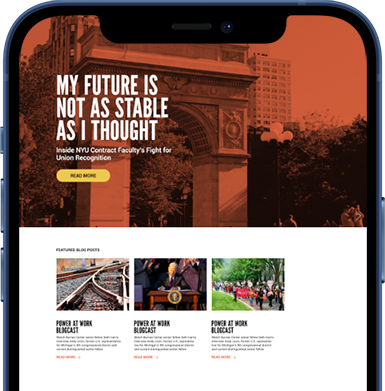Photo by Joe Piette, CC BY-SA 2.0
Introduction
As political power accumulates in fewer hands, our democratic ideals erode. Every day, autocratic leaders, far-right parties, and billionaire elites are rewriting the rules to weaken civil society and tighten their control. Yet, one institution remains a consistent check on them: trade unions.
As the International Trade Union Confederation (ITUC) documents in its 2025 Corporate Underminers of Democracy report, large corporations are not passive actors in this shift; they are active participants pressing for policies that undermine labor rights and democratic accountability. In the United States, rebuilding worker power is not only an economic imperative but a democratic one, as unions are essential to countering the authoritarian future that America is currently being dragged towards.
Power At Work examined the ITUC’s report, and a new, closely related, and recently released book entitled “Master Plan: The Hidden Plot to Legalize Corruption in America,” in “Power At Work Blogcast #109: Corporations Undermining Democracy with David Sirota and Luc Triangle.” This post supplements the blogcast with a further description and analysis of the ITUC’s report.
Photo by ITUC
Corporate Power and Democratic Erosion
The ITUC’s report profiles firms like Amazon, Meta, and ExxonMobil. It details how their lobbying power, surveillance technology, and government contracts give them inflated influence over public policy. These practices undermine democratic norms in two ways. First, they tilt the policy process toward elite, moneyed interests while drowning out the voices of ordinary citizens. Second, they weaken unions through aggressive anti-organizing tactics, political power, and lawsuits that erode one of the few institutional checks on corporate power. This pattern is not confined to one country. From Brazil to Hungary, ITUC documents how transnational corporations partner with illiberal governments to normalize labor suppression and restrict civic space.
Militarization and the Corporate Capture of Democracy
A central focus of the ITUC report is how corporations use their power to profit from militarization and global conflict. Major technology, energy, and defense firms increasingly position themselves at the intersection of private capital and public security.by leveraging military contracts and surveillance infrastructure for profit (ITUC, 2025). According to the ITUC, companies such as Meta, Amazon, and SpaceX, for example, have secured lucrative defense and intelligence contracts that blur the line between civilian enterprise and state power. This militarization of the corporate sector not only fuels global instability. It also erodes accountability by creating a feedback loop in which war and repression generate profits that are then reinvested in lobbying and political influence. As the ITUC warns, this alignment between corporate and militaristic interests deepens the authoritarian drift by prioritizing profit over peace, secrecy over transparency, and autocratic control over democratic participation.
Re-Union: How Bold Labor Reforms Can Repair, Revitalize, and Reunite the United States; Cornell University Press
Unions as a Democratic Counterforce
David Madland argues in his book, Re-Union: How Bold Labor Reforms Can Repair, Revitalize, and Reunite the United States, that strong unions have long been “schools of democracy,” teaching workers how to deliberate, negotiate, and hold leaders accountable. In the U.S., he notes, the decline of unions over the past four decades has coincided with rising inequality, political polarization, and a fraying of civic trust—all conditions that autocrats and demagogues exploit. Robust unions, by contrast, foster cross-class and cross-racial solidarity, expanding the electorate and increasing participation in civic life. In Madland’s view, revitalizing unions through bold labor reforms, such as sectoral bargaining and stronger protections against retaliation, is not just good policy for wages but a necessary strategy for shoring up democracy itself.
Worker Power Beyond the Workplace
Both ITUC and Madland highlight that union power extends beyond paychecks. Unions are often at the forefront of campaigns for climate justice, digital privacy, and anti-corruption reforms—areas where corporate and government interests frequently align to suppress dissent. The ITUC’s “Global Call to Action for Peace,” for example, frames labor rights as part of a broader struggle against “billionaire coups” that threaten democratic governance worldwide. In the U.S. context, Madland envisions unions as part of a civic infrastructure that can help bridge divides and rebuild faith in democratic institutions.
"No Kings No Billionaires", by Geoff Livingston, CC BY 4.0
Conclusion
The rise of autocracy and the erosion of worker power are mutually reinforcing trends. Concentrated wealth and political influence undermine both labor rights and democratic institutions, while weakened unions leave citizens more vulnerable to elite capture and authoritarian populism. Yet unions remain one of the strongest counterweights available. Revitalizing organized labor is not simply about improving working conditions, but about defending and rebuilding democracy itself.




